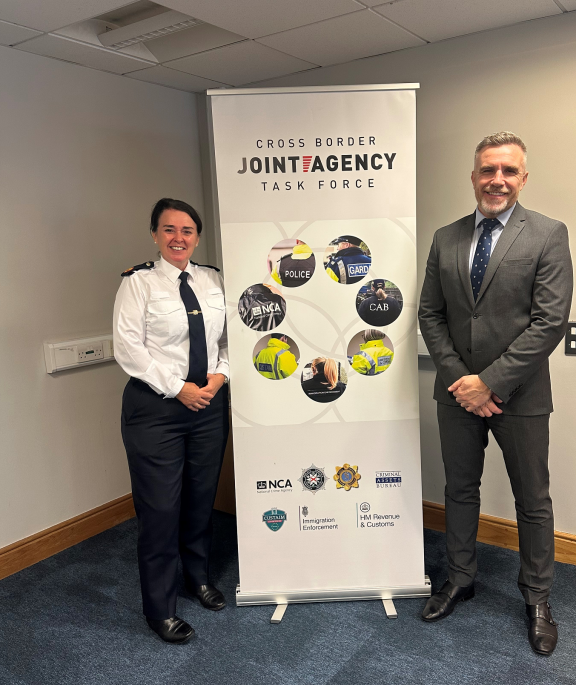
The Police Service of Northern Ireland enlisted the support of partners for a holistic day of action, on Monday 16 October.
The first phase of the day saw Organised Crime Branch, with the support of district officers and partner organisations tackle the very real issue of modern slavery and human trafficking.
The co-ordinated approach marked the start of Anti-Slavery Week, an awareness week, which this year runs from 16 to 22 October.
Detective Chief Superintendent Andy Hill said: “Detectives from the Modern Slavery and Human Trafficking Unit and our wider Crime Department were joined by uniformed colleagues from right across the country, from local policing teams to district support teams. The collective aim was to raise awareness, and to support and safeguard innocent victims.
“Our team is 100% committed to tackling the horror of modern slavery and human trafficking, and we will continue to work day-in day-out to do just that.
“Anti-Slavery Week brings a welcome opportunity for everyone – including police forces, agencies, charities and individuals – to put this often hidden crime in the spotlight. And, in line with this, we’ve chosen to highlight one concerted ‘all-out’ day of action.
“Importantly, our day of action has seen officers across the country share expertise and local knowledge. We’ve teamed up with partner organisations and forces, such as Border Force and Belfast Harbour Police, while colleagues in An Garda Síochána have been carrying out similar activity in the Republic of Ireland. The joined-up and ultimate aim is to safeguard and protect vulnerable people.”
The Police Service has provided an outline of the activity, which includes:
- Visited 83 estate agents, right throughout the country, to raise awareness of the use of properties by traffickers to house innocent victims.
- Visited 40 hotels to engage with staff and raise awareness of the signs and indictors of human trafficking.
- Conducted safeguarding and screening exercises at ‘at risk’ locations, including car washes, massage parlours, nail bars and brothels.
- Overt presence at ports, airports and transport hubs to raise awareness and safeguard any potential victims.
Detective Chief Superintendent Hill is appealing to anyone with information or concerns that someone is being exploited to contact detectives on 101.
He added: “Likewise, if you are a victim please speak to us. We want to help you. And I assure you that you will be treated with respect and sensitivity – at every step of the way.”
The second phase of the day was a cross-border anti-crime operation carried out at border locations with colleagues in the Joint Agency Task Force, including An Garda Síochána. This involved use of Automatic Number Plate Recognition (ANPR) technology, with 95 ANPR alerts actioned and 11 vehicles seized. A total of 130 vehicle checkpoints and 37 searches were conducted.
Chief Superintendent Sam Donaldson, who was in charge of the overall operation, summarised the day of action: “As part of our continuing focus on tackling crime and keeping the public safe, our all-out day was designed to maximise senior officer and staff visibility. Working in partnership, the aim was to address human trafficking and reduce cross-border crime. My thanks go to the officers who were involved in planning and delivering the operation, and to our partner agencies who assisted on the day. Further all-out days are being planned for the months ahead.”
Numerous partners supported the Police Service’s ‘all-out’ day of action, including the National Crime Agency, Border Force, Harbour Police, Home Office Immigration Enforcement, Gangmasters and Labour Abuse Authority and An Garda Síochána.
The Police Service is asking anyone with information or concerns to contact them on 101, or to contact the Modern Slavery Helpline on 0800 012 1700.
Tell-tale signs that someone is a victim of modern slavery vary depending on the type of exploitation, but there are things to look out for which are common across all forms of modern slavery. They include:
- Someone who can’t produce their passport or personal documents
- Someone who is unsure of their home address or the local area
- Someone who is distrustful of authorities as traffickers may have told victims that police will be violent towards them
- Someone who has no access to medical treatment
- Someone who appears to be under the control of others or always has someone else speak on their behalf
- An over-crowded house or flat with a regular turnover of new occupants
- Someone who may not have cash as they don’t get to keep the money that they earn
Visit the Human Trafficking page on the Police Service of Northern Ireland website for more information on the signs to look out for:
